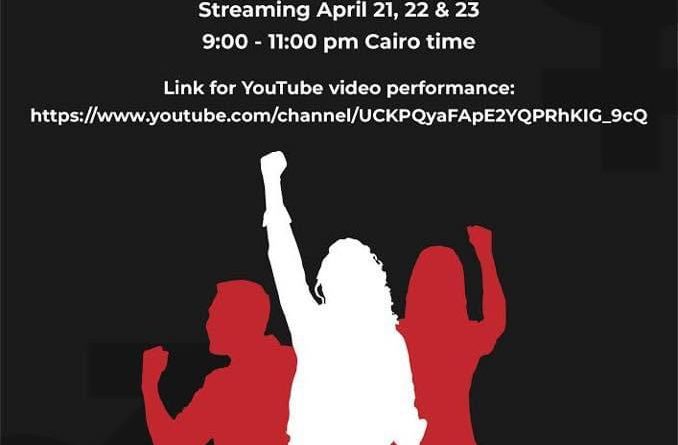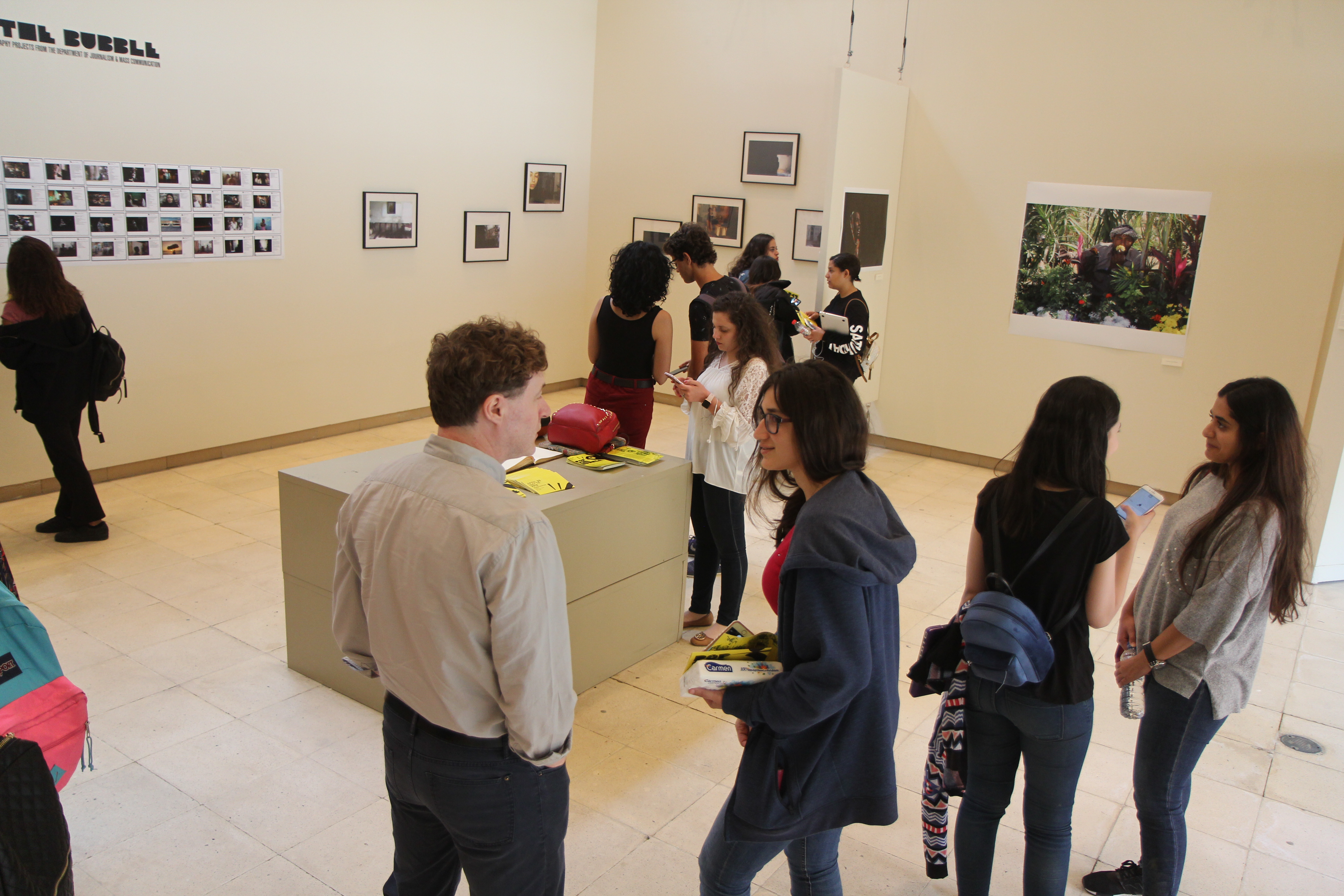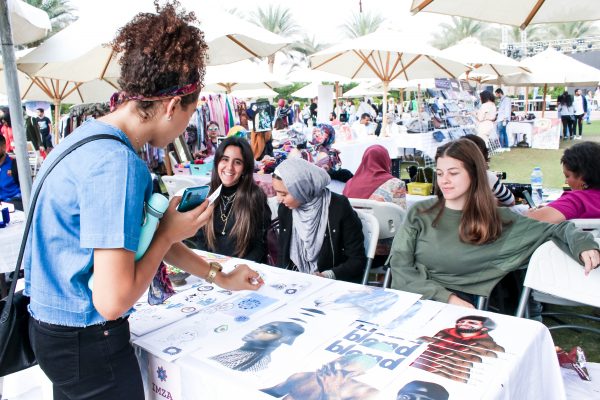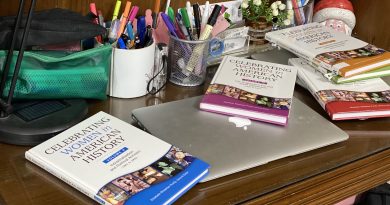Anti-Harassment Play Msh Zanbek Livestreamed
By: Hayam Mahran
@hayamabdallahh
Msh Zanbek (Not Your Fault), the popular AUC play tackling issues of sexual harassment, was livestreamed to audiences earlier this week.
This came after a performance scheduled for the end of March at the Tahrir campus was cancelled. Although the play had first debuted at the New Cairo campus in March, the decision to go online allowed it to reach a wider audience who may have not attended the physical production due to pandemic restrictions.
The play is comprised of five mini-productions each staged at different locations throughout the New Cairo campus, and each showing different instances of sexual harassment. Audiences were led from one play to the next by a guide.
Jillian Campana, professor of theatre and associate dean of the School of Humanities and Social Sciences, said that physically moving from one play to the next was done on purpose to give audiences the opportunity to reflect on the events of each story before moving on to the next.
“In addition, metaphorically, setting these stories in various locations implies that there is sexual harassment in every corner,” Campana said.
In every mini-play, creators made it a point to reference the fact that 99 percent of women and girls in Egypt have experienced sexual harassment.
Insah (Forget Him), the first play, depicts the struggle of a girl who was sexually harassed when she was 16. She then tries to overcome the trauma and go back to her normal life.
The play shows the pain experienced after one had survived being sexually harassed, and the struggle one goes through to overcome and forget.
“Even though it was an important role, it was not as easy as it seems to be portrayed as a harasser in the play,” said Shehab Ayman, who played Assaf, a harasser.
The second play, See Me, features a family who react negatively to the fact that their daughter has been sexually harassed.
The play shows how families can devastate their children’s lives by dealing with the situation in the wrong way.
The next play, The Report highlights the process of reporting sexual harassment cases at AUC, in addition to emphasizing the fact that sexual harassment can happen to any woman regardless of her clothes.
The Report features two girls, one who wears hijab and another who doesn’t; both girls experience sexual harassment. One of them is sexually harassed by her professor and is unsure whether to report it or not, and the other girl wearing the hijab is harassed in the metro. This is meant to show that anyone can be subject to sexual harassment regardless of what they’re wearing.
Whereas Esh Fahemek (How Do You Know?) focuses on the notion that all women from different social classes can experience sexual harassment.
It focuses on two women who were sexually harassed, one of whom is an AUC worker, married to an abusive husband who always believes that she is at fault. This woman thinks that sexual harassment happens to women from lower strata only. This idea then changes when she meets an AUC student who proves her wrong and tells her that she had been harassed by her uncle.
Kerolos Zarif, an actor who played the abusive husband Abdellatif, says the play’s title is intended to be a question directed toward naysayers and asks them “how do you know?”.
“Esh Fahemek is taken from two perspectives; how do you know that your wife is the reason for the harassment incident, and how do you know that only a specific class in the community is facing sexual harassment,” Zarif said.
The last play, The Day We Met, explores sexual harassment in an intimate relationship, focusing on the idea that this act can still happen among people who are close to one another.
This scene shows the struggle of a girl who was touched inappropriately and without her consent by her partner the first time they met. As the relationship progresses, she continues to surrender just to please her partner although she is visibly uncomfortable.
Lina Hegazy, a Business Administration junior who attended one of the performances on campus, found that it focused on a very crucial point in sexual harassment; the victim is not at fault.
“I liked that they also discussed how victims suffer after they experience sexual harassment, and how difficult it is for them to return to their normal lives and trust people,” Hegazy said.
The positive reviews from the audience come as sweet reward to those who began the production process early in summer 2020. Dina Amin, head of the theatre program and associate professor of theatre, along with Campana, held meetings with the students and alumni to understand the complexity of the issue of sexual harassment from their point of view.
“After the summer of 2020, and the international coverage that surrounded the recent harassments and assaults in this country, we knew audiences were ready to see the issue represented dramatically,” Campana told The Caravan.
Campana explained that even though there are various films, novels and short stories that speak to the issue of sexual harassment in Egypt, there are very few theatrical works that broach this subject matter.
“Therefore, we decided to contribute [with] original plays [hoping] they will enrich the existing archives and encourage more works that raise awareness and social change,” Campana said.
The play involved students and alumni who worked as directors, playwrights, actors, designers and managers.
Although the play was ultimately a success, there were some challenges the crew and the co-creators faced while preparing for the play, one of which was coming up with a suitable and creative title that would grab the audience’s attention.
The play was originally titled “You, w-ana too” (You, and Me, too), but according to Campana, the title Msh Zanbek was the most convenient as it rejects the common assumption that victims of harassment and assault are at fault.




